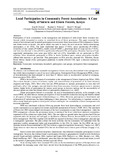Local Participation in Community Forest Associations: A Case Study of Sururu and Eburu Forests, Kenya
Date
2015Author
Mutune, Jane M
Wahome, Raphael G
Mungai, David N
Type
ArticleLanguage
enMetadata
Show full item recordAbstract
Participation of local communities in the management and utilization of state-owned forest resources has
become widely recognized in contrast to centralised forms of forest governance. This paper examined the
extent of inclusiveness and household participation in community forest associations (CFAs) adjacent to Sururu
and Eburu forests in Kenya. The probit model was used to assess the socio-economic factors determining
participation in the CFAs. The study established that gender (P<0.05), group membership (P<0.0001),
ownership of tree nursery (P<0.0001), wealth status (P<0.0001), percentage share of wage income (P<0.05),
and farm size allocated to trees (P<0.05) significantly influenced CFA participation. However, because of high
opportunity participation costs some poor (68%) and rich (65%) households did not participate in CFA
activities. Since households participated in CFAs to derive livelihood gains, unclear participation benefits
offered little incentive to get involved. Thus participation in CFA activities remained low. Therefore, Kenya
Forest Service should review participation guidelines to enable effective CFA input in decision making on
forest issues.
Citation
International Journal of African and Asian Studies, Vol.13, 2015Rights
Attribution-NonCommercial-NoDerivs 3.0 United StatesUsage Rights
http://creativecommons.org/licenses/by-nc-nd/3.0/us/Collections
The following license files are associated with this item:


